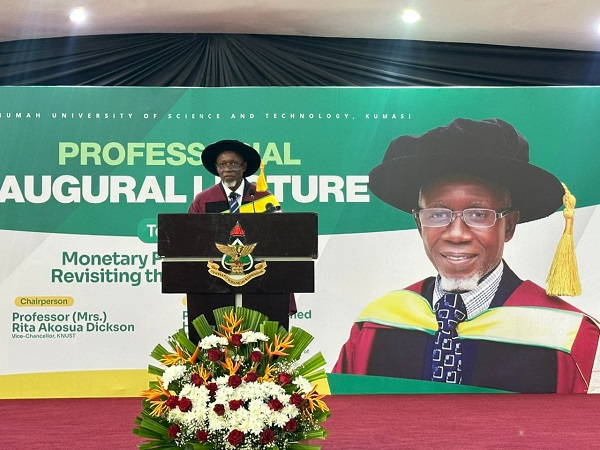 Professor Mohammed Hadrat Yusif, Professor of Economics at KNUST
Professor Mohammed Hadrat Yusif, Professor of Economics at KNUST
Ghana’s monetary policy has failed to deliver meaningful economic transformation, according to Professor Mohammed Hadrat Yusif, a Professor of Economics at the Kwame Nkrumah University of Science and Technology (KNUST).
Delivering his inaugural lecture on the topic “Monetary Policy in Ghana: Revisiting the Tobin’s Model,” Professor Yusif offered a sobering assessment of the country’s economic trajectory, describing Ghana as being “trapped in a cycle of debt, underdevelopment, and poor leadership.”
He lamented that Ghana, once economically comparable to countries such as South Korea and Malaysia in the 1950s, now lags significantly behind due to structural weaknesses, high inflation, weak reserves, and poor infrastructure.
“Monetary policy alone cannot save Ghana. We need fiscal discipline, innovation, and a truly independent central bank,” Professor Yusif said.
He attributed much of the country’s economic stagnation to excessive political interference, particularly from the Ministry of Finance.
He called for a review of key legal frameworks, including the Fiscal Responsibility Act and the Bank of Ghana Act, to restore the credibility of monetary institutions.
As part of his lecture, Prof. Yusif outlined a series of policy recommendations aimed at supporting sustainable economic growth in Ghana.
He advocated for a shift from the current inflation-targeting framework to Nominal GDP targeting, arguing that this approach would provide a more flexible and growth-oriented monetary policy framework.
He also emphasised the importance of promoting responsible gold and cocoa production, noting that these sectors remain vital to Ghana’s export earnings and rural livelihoods.
Strengthening environmental and governance standards in these industries, he argued, would enhance their long-term value to the economy.
Another key recommendation was the need to expand public-private partnerships (PPPs) to bridge infrastructure and financing gaps, particularly in sectors such as energy, transportation, and agriculture.
Professor Yusif further urged the government to strengthen support for Small and Medium Enterprises (SMEs), which he described as the backbone of employment and innovation in the Ghanaian economy.
Finally, he called for increased investment in research and development, particularly through stronger collaboration between universities and government institutions. This, he noted, would ensure that policymaking is grounded in evidence and aligned with national development priorities.
He also urged closer collaboration between the Bank of Ghana and academic institutions to ensure monetary policy is informed by robust, locally grounded research.
“Ghana must define its future, else the future will define us,” he concluded, drawing strong applause from the audience.
The lecture, held at the KNUST campus in Kumasi, was chaired by the Vice-Chancellor, Professor Mrs. Rita Akosua Dickson, and attended by academics, policymakers, students, and members of the public.
